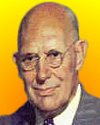 (source)
(source)
|
Charles F. Kettering
(29 Aug 1876 - 25 Nov 1958)
American engineer whose 140 patents included the electric starter, car lighting and ignition systems.
|
Charles F. Kettering Quotes on Failure (10 quotes)
>> Click for 67 Science Quotes by Charles F. Kettering
>> Click for Charles F. Kettering Quotes on | Achievement | Future | Idea | Inventor | Problem | Progress | Research | Success |
>> Click for 67 Science Quotes by Charles F. Kettering
>> Click for Charles F. Kettering Quotes on | Achievement | Future | Idea | Inventor | Problem | Progress | Research | Success |
99 percent of success is built on failure.
— Charles F. Kettering
An inventor fails 999 times, and if he succeeds once, he’s in. He treats his failures simply as practice shots.
— Charles F. Kettering
An inventor is simply a fellow who doesn’t take his education too seriously. You see, from the time a person is six years old until he graduates form college he has to take three or four examinations a year. If he flunks once, he is out. But an inventor is almost always failing. He tries and fails maybe a thousand times. It he succeeds once then he’s in. These two things are diametrically opposite. We often say that the biggest job we have is to teach a newly hired employee how to fail intelligently. We have to train him to experiment over and over and to keep on trying and failing until he learns what will work.
— Charles F. Kettering
In 'How Can We Develop Inventors?' presented to the Annual meeting of the American Society of Society Engineers. Reprinted in Mechanical Engineering (Apr 1944). Collected in Prophet of Progress: Selections from the Speeches of Charles F. Kettering (1961), 108.
Believe and act as if it were impossible to fail.
— Charles F. Kettering
Every great improvement has come after repeated failures. Virtually nothing comes out right the first time. Failures, repeated failures, are finger posts on the road to achievement. One fails forward toward success.
— Charles F. Kettering
It doesn't matter if you try and try and try again, and fail. It does matter if you try and fail, and fail to try again.
— Charles F. Kettering
It is not a disgrace to fail. Failing is one of the greatest arts in the world.
— Charles F. Kettering
Suppose the results of a line of study are negative. It might save a lot of otherwise wasted money to know a thing won’t work. But how do you accurately evaluate negative results? ... The power plant in [the recently developed streamline trains] is a Diesel engine of a type which was tried out many [around 25] years ago and found to be a failure. … We didn’t know how to build them. The principle upon which it operated was sound. [Since then much has been] learned in metallurgy [and] the accuracy with which parts can be manufactured
When this type of engine was given another chance it was an immediate success [because now] an accuracy of a quarter of a tenth of a thousandth of an inch [prevents high-pressure oil leaks]. … If we had taken the results of past experience without questioning the reason for the first failure, we would never have had the present light-weight, high-speed Diesel engine which appears to be the spark that will revitalize the railroad business.
When this type of engine was given another chance it was an immediate success [because now] an accuracy of a quarter of a tenth of a thousandth of an inch [prevents high-pressure oil leaks]. … If we had taken the results of past experience without questioning the reason for the first failure, we would never have had the present light-weight, high-speed Diesel engine which appears to be the spark that will revitalize the railroad business.
— Charles F. Kettering
'Industrial Prospecting', an address to the Founder Societies of Engineers (20 May 1935). In National Research Council, Reprint and Circular Series of the National Research Council (1933), No. 107, 2-3.
The only time you mustn't fail is the last time you try.
— Charles F. Kettering
We need to teach the highly educated man that it is not a disgrace to fail and that he must analyze every failure to find its cause. He must learn how to fail intelligently, for failing is one of the greatest arts in the world.
— Charles F. Kettering
See also:
- 29 Aug - short biography, births, deaths and events on date of Kettering's birth.
- Short Stories of Science and Invention - Index to A Collection of Radio Talks by Charles F. Kettering
- Charles Franklin Kettering: A Biography, by T. A. Boyd. - book suggestion.
 In science it often happens that scientists say, 'You know that's a really good argument; my position is mistaken,' and then they would actually change their minds and you never hear that old view from them again. They really do it. It doesn't happen as often as it should, because scientists are human and change is sometimes painful. But it happens every day. I cannot recall the last time something like that happened in politics or religion.
(1987) --
In science it often happens that scientists say, 'You know that's a really good argument; my position is mistaken,' and then they would actually change their minds and you never hear that old view from them again. They really do it. It doesn't happen as often as it should, because scientists are human and change is sometimes painful. But it happens every day. I cannot recall the last time something like that happened in politics or religion.
(1987) -- 


